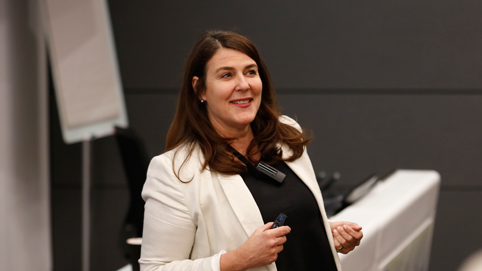Business book authors impress LBS faculty
Two London Business School professors judge leading business literature prize

Business writing is in rude health, according to two London Business School (LBS) faculty members involved in the Financial Times book prize season.
Every November, the business newspaper awards two prizes – the FT & McKinsey Business Book of the Year and the Bracken Bower Prize. Herminia Ibarra (pictured), Charles Handy Chair in Organisational Behaviour, was a judge on the FT McKinsey prize, while Isabel Fernandez-Mateo, Adecco Professor of Strategy and Entrepreneurship, helped judge the Bracken Bower.
John Carreyrou picked up the FT McKinsey prize for Bad Blood: Secrets and Lies in a Silicon Valley Startup and Andrew Leon Hanna won the Bracken Bower – which judges book pitches from writers under the age of 35 – for Twenty-Five Million Sparks, a tale about refugee-entrepreneurs.
Carreyrou’s tale is an investigative piece of story-telling, covering the extraordinary rise and fall of blood-testing firm Theranos, which raised US$700 million (£546 million) but then collapsed after defrauding investors, doctors and patients.
Judging the FT KcKinsey prize is a particular challenge, according to Professor Ibarra, because the category is so diverse. Past winners have included weighty academic tomes, business biographies and journalistic stories.
“Bad Blood is a fantastic piece of journalism that reads like a thriller,” said Professor Ibarra. “It is more than a story about one startup in Silicon Valley; it can be read as a commentary on the whole ‘move fast and break things’ philosophy.”
Elizabeth Holmes, the founder of Theranos, claimed she had developed technology that would revolutionise blood testing by replicating laboratory tests in a desktop machine. However, behind the scenes she was running tests using established lab methods, while attracting high-profile angel investors in droves based upon the fake technology. It begs the question how and why Holmes, once hailed as a visionary, pulled off the confidence trick for as long as she did.
“Holmes had all these people under a spell, but investors were not asking the obvious questions about the machines,” said Professor Ibarra.
“The book doesn’t delve into hypothesis. Those close to the story believe she persuaded herself the technology would ultimately work. Carreyrou doesn’t explore whether that’s the case or if she was lying through her teeth; it keeps to the facts and lets the reader reach their own conclusions.
“I teach about leadership and it is interesting to read about the people we are more likely to follow without asking questions; the cult of charisma and absolute certainty. There is a cult of the ‘founder entrepreneur,’ particularly those who drop out of school to pursue a huge vision, like Holmes. The book also raises interesting questions about working for these people, what you do about the questions you might have and when those questions are silenced.”
Carreyrou is a Wall Street Journal reporter whose investigation unmasked Holmes. His book has attracted the attention of Adam McKay, the film director of the Big Short, with Jennifer Lawrence signed on to play Holmes in the lead role.
“Judging the Bracken Bower Prize for the last three years has been rewarding,” said Professor Fernandez-Mateo. “It keeps me informed about what young authors are thinking. Some of the proposals bring to my attention issues I had never considered. Other times they offer new perspectives on topics that overlap with my own research and teaching – such as changes in the dynamics of careers and the drivers and consequences of demographic diversity for organisations.
“The proposals have been of high quality; young writers are becoming more interested in the consequences of business’ actions, really taking a broader view of organisations in society, which intersects with science, politics, economics and law.”
Andrew Leon Hanna’s tale of refugee-entrepreneurs, Twenty-Five Million Sparks, demonstrates the breadth of types of stories the two judging panels had to contend with. The Harvard law student and social enterprise founder’s book proposal relates the refugee experience to being an entrepreneur, to recovering human dignity and individuals’ response to the global migration crisis.




